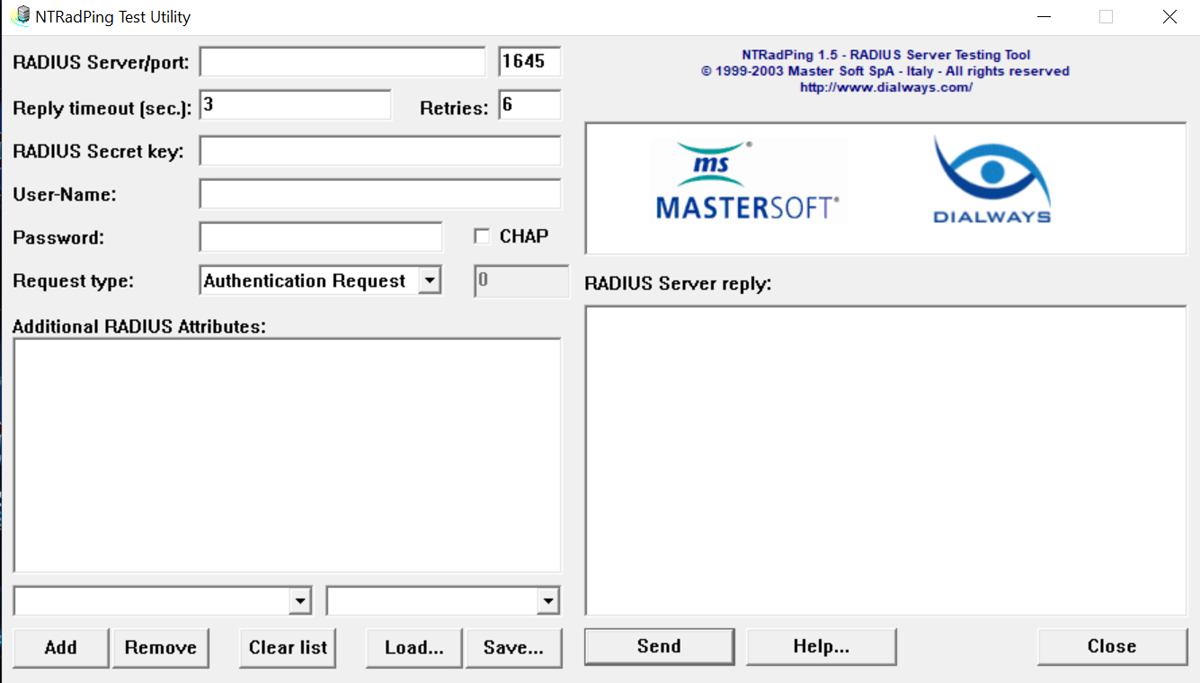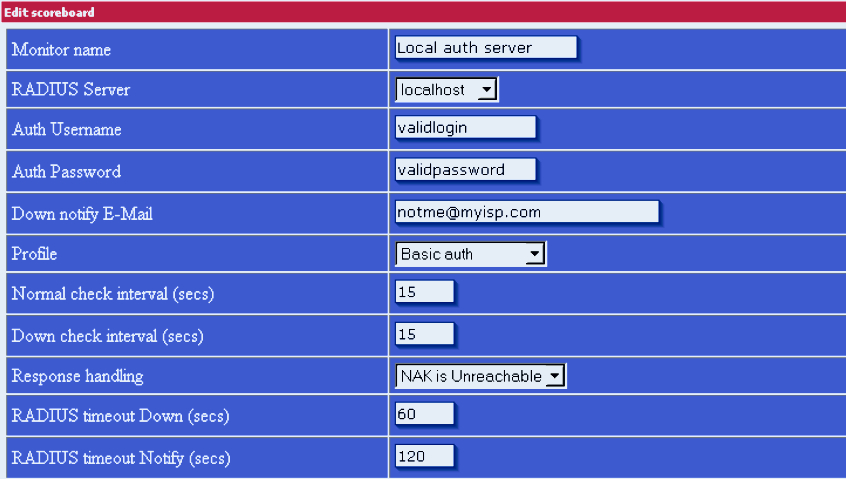RADIUS servers are widely used by internet service providers (ISPs) and public Wi-Fi providers to manage user credentials, enforce policies, and collect usage data. Enterprises and corporate networks also use RADIUS servers to authenticate and authorize users to access their networks.
Remote Authentication Dial-In User Service (RADIUS) protocols are essential to strengthen network security. The importance of RADIUS servers that provide AAA—authentication, authorization, and accounting—cannot be denied. They use an authentication protocol that grants or denies users access to various services, including Wi-Fi, VPN, and applications.
According to Grand View Research, the global server market was valued at $83.66 billion in 2020 and is expected to grow at a compound annual growth rate (CAGR) of 7.8% from 2021 to 2028. The increasing adoption of cloud computing, mobile devices, 5G, IoT, and network technology drives the need for reliable RADIUS servers and testing tools.
As the world becomes increasingly connected and networks evolve, testing RADIUS servers has become essential. This is where RADIUS server testing and monitoring tools come in. The software helps network administrators and engineers verify their RADIUS servers’ functionality, performance, and security.
If you’re looking for a free RADIUS server testing and monitoring tool for your network, here are our picks for the top options available in 2023:
- NTRadPing: Best for simple authentication and accounting simulation requests
- radtest by FreeRADIUS: Best for simple testing and debugging
- radclient by FreeRADIUS: Best for advanced testing and scripting
- Radlogin: Best for simulating, debugging, and monitoring
- RadPerf: Best for measuring performance and load-testing
- test access radius-server: Best for automated testing and reporting
Top RADIUS Testing and Monitoring Tools Comparison Chart
The following chart breaks down the key differences between each of these tools, their strengths, and their capabilities.
| Pricing | OS | Graphical User Interface (GUI) | Packet Sending and Receiving | Response Time Monitoring | User Experience Monitoring | Dictionary | Multiple Location Testing | |
|---|---|---|---|---|---|---|---|---|
| NTRadPing | Free | Windows | ✔ | ✔ | ✔ | ✔ | ✔ | ✔ |
| radtest | Free | Linux, FreeBSD, Solaris | ✘ | ✔ | ✘ | ✘ | ✔ | ✘ |
| radclient | Free | Linux, FreeBSD, Solaris | ✘ | ✔ | ✔ | ✘ | ✔ | ✘ |
| Radlogin | Free | Windows, Linux, Solaris, FreeBSD | ✔ | ✔ | ✔ | ✘ | ✔ | ✔ |
| RadPerf | Free | Windows, macOS, Linux. | ✔ | ✔ | ✔ | ✔ | ✔ | ✔ |
| test access radius-server | Free | Windows, macOS, Linux. | ✔ | ✔ | ✔ | ✔ | ✔ | ✘ |
Jump to:
- Key Features of RADIUS Server Testing and Monitoring Tools
- How Do I Choose the Best RADIUS Server Testing and Monitoring Software for My Business?
- Methodology

NTRadPing
Best for simple authentication and accounting simulation requests
NTRadPing is a free RADIUS client program. NTRadPing is a robust, easy-to-use tool for testing installations of your RADIUS servers. Through NTRadPing, you can run simple authentication and accounting simulation requests.
The tool is popular due to its simplicity and streamlined functions.

Pricing
NTRadPing is a freeware Windows utility that is completely free.
Features
- Sends and receives RADIUS packets on a Windows GUI.
- Preconfigured packet types and attributes, with the ability to define custom ones.
- Save and load settings, as well as RADIUS file usage.
- Testing of different types of 2FA methods.
Pros
- Free and easy to use for verifying configurations.
- Users can send and receive various types of RADIUS packets and attributes.
- You can save and load settings and use a RADIUS dictionary file (a well-defined, included file that can be customized with vendor-specific attributes as needed).
- The app has a help button with summarized operation information.
- Users can select preconfigured packet types and attributes or customize their own.
- Users can quickly input server, user, packet, and attribute details on the NTRadPing GUI.
Cons
- It’s only available for Windows platforms.
- It doesn’t support CHAP authentication.
- It doesn’t provide performance or load-testing features.

radtest by FreeRADIUS
Best for simple testing and debugging
radtest is a free and open-source Linux command-line program that’s included with the open-source FreeRADIUS project. The FreeRADIUS organization authenticates one-third of all users on the internet, and radtest is its simplest RADIUS server testing and monitoring tool.
radtest is popular because it’s easy to use and requires only minimal syntax. It can be used to test the configuration of the RADIUS server or check if it is up.
Pricing
radtest is available for free download and use without limitations.
Features
- Sends and receives packets from the command line.
- Tests different types of RADIUS authentication methods.
- Compatible with RADIUS dictionary file.
- Displays response code and attributes from RADIUS server.
- List of attribute/value pairs is based on the command-line arguments.
Pros
- Fast, simple, and convenient way to test a RADIUS server.
Cons
- No graphic user interface.
- Technical knowledge of commands is required.
- Doesn’t support CHAP authentication.
- Doesn’t provide performance or load-testing features.

radclient by FreeRADIUS
Best for advanced testing and scripting
Radclient is also a Linux command-line program that can send and receive packets. Like radtest, this tool is developed by FreeRADIUS, but unlike radtest, it’s a comprehensive testing and monitoring tool for RADIUS servers.
radclient can test different RADIUS authentication methods, such as PAP, CHAP, MS-CHAP, and EAP. It can also use the RADIUS dictionary file and display the response code and attributes from the RADIUS server.
Pricing
- Radclient is free and open-source.
Features
- Sends arbitrary packets to a server and shows the reply.
- Tests configuration changes.
- Reads radius attribute/value pairs from standard input or a file specified on the command line.
- Encodes attribute/value pairs using the dictionary and sends them to the remote server.
- User-Password and CHAP-Password attributes are automatically encrypted before the packet is sent to the server.
- Monitors if a RADIUS server is up.
- Sends authentication, accounting, and status information and disconnects packets.
Pros
- Radclient can send arbitrary RADIUS packets to a RADIUS server and show the reply.
- Can monitor if a RADIUS server is up.
- Users can send authentication, accounting, and status information and disconnect packets.
- Users can also pass desired attributes in the command line and specify the number of times to send the packet, number of retry times, delay between packets, and timeout limit.
- Uses the default dictionaries included with FreeRADIUS.
- It can create CHAP Access-Request packets.
Cons
- Requires an administrator’s username and password to log into the RADIUS server.
- It has limited options to specify debug levels.

Radlogin by IEA Software, Inc.
Best for simulating, debugging, and monitoring
Radlogin is a comprehensive RADIUS testing and monitoring tool developed by IEA Software, Inc.—the company that developed the RadiusNT and RadiusX servers. The tool runs on Windows, FreeBSD, Sparc Solaris, and Linux platforms.
Because it’s easy to use and can simulate, debug, and monitor RADIUS and network access servers (NAS), it is one of the most-used software options in this market.
As with other FreeRADIUS server testing tools, Radlogin can send basic authentication, accounting, and disconnect requests, but it’s more advanced than the other programs we’ve discussed.
Pricing
Radlogin is free to download and use without limitations.
Features
- Provides support for RFC 5176 Disconnect and CoA messages.
- Sends test authentication and accounting requests.
- User-defined fields, built-in counters, random variables, addresses, and session IDs.
- Comprehensive data dictionary, supporting over 80 vendors.
- IPv6 transport and attributes.
- Support for 16-bit and 32-bit VSA formats, tunnel encryption, large attribute fragmentation, nested TLVs, and extension attributes.
- Can validate RADIUS packet decoder.
- Server monitoring with email notification and uptime statistics.

Pros
- Users can send RADIUS queries from the command line, web-based interfaces, or web service APIs.
- The Radlogin dictionary supports more than 70 vendors.
- Validates the RADIUS packet decodes.
- Status and reply details are displayed and stored for later reference.
- Free to download and use without limitations.
- Advanced RADIUS server testing and monitoring tool.
- Can monitor hundreds of RADIUS servers, keep uptime statistics, and send email/SMS pager notifications if a server becomes unreachable.
Cons
- Advanced technical knowledge is needed to use this tool.
- The configuration and user PDF manual that are included with Radlogin download can be overwhelming for new users.

RadPerf by NetworkRADIUS
Best for measuring performance and load-testing
RadPerf is provided free by NetworkRADIUS, a FreeRADIUS consulting company. RadPerf is a command-based client program that is explicitly designed for load-testing RADIUS servers to see if they’re production-ready. It runs on Windows, macOS, and Linux.
Pricing
RadPerf is free to download and use without limitations.
Features
- As a performance-testing utility, the app can send authentication and accounting packets at varying rates.
- RadPerf can simulate user behavior, spikes in traffic, and long-lived user sessions.
- RadPerf can produce reports that summarize offered load versus accepted load.
Pros
- Can test the production-readiness of a RADIUS system.
- Does not require advanced technical skills in RADIUS servers.
- Can use a list of users and passwords in a CSV file to generate packets.
Cons
- It may not support all RADIUS attributes or features.

test access radius-server by Juniper Networks
Best for automated testing and reporting
test access radius-server, also known as RadiusTest, is a free RADIUS client utility provided by Juniper Networks.
The test access radius-server runs on Windows as a portable program that doesn’t require installation. Users can input all settings via both the configuration file and the GUI. This tool’s RADIUS server dictionary is loaded with popular vendor attributes and can be customized as needed.
Pricing
test access radius-server is free to download and use without limitations.
Features
- Allows users to test and debug RADIUS servers and clients.
- Simulates various scenarios and messages, such as authentication requests, accounting packets, and responses.
- Shows status and elapsed time for each packet.
- Lists a rundown of overall testing statistics.
- Details button allows users to view status information and packets sent and received.
Pros
- It is easy to use and has a user-friendly interface.
- It is free and open-source software.
- It can perform basic validation and error checking on RADIUS packets.
- It creates automated reports.
Cons
- It’s limited to only sending packets for authentication and accounting (PAP and CHAP).
Featured Partners: RMM Software
NinjaOne
NinjaRMM is NinjaOne’s powerful easy-to-use RMM, offering all the features, flexibility, and power MSPs need in a fast-to-setup, easier-to-use package. NinjaRMM gives you complete visibility into and control over your Windows, Mac, and Linux servers, workstations and laptops as well as virtual machines, and networking devices. Our centralized, policy-based management approach puts automation at the center of your endpoint management strategy. NinjaRMM is built for the way MSPs work.
Site24x7
Site24x7 provides a comprehensive solution for remote monitoring and management of diverse client environments, including endpoints, websites, networks, servers, applications, and cloud. Create customized dashboards, NOC views, and business views highlighting all the critical metrics.
With features like white-labeling, multi-tenancy, customizable roles and permissions, and detailed reports and service level agreements, Site24x7 helps you manage your customer accounts with ease.
Key Features of RADIUS Server Testing and Monitoring Tools
While most RADIUS servers come with their own testing tools, it’s always good to have choices, especially when several free alternatives are available.
Configuring and troubleshooting RADIUS servers can be challenging, especially when dealing with different client devices and protocols. That’s why RADIUS server testing and monitoring tools are helpful for network administrators who want to ensure optimal performance and security. Here are some of the top features that these tools have.
Packet Sending and Receiving
One of the basic features of RADIUS server testing and monitoring tools is the ability to send packets to a RADIUS server and receive replies. This can help test the initial configuration of the server as well as verify the changes made to the settings. The tools can send different types of packets, such as authentication, accounting, status, and disconnect, with various attributes and values.
Response Time Measurement
RADIUS server testing and monitoring tools can also measure the server’s response time. This can help evaluate the performance and availability of the server and compare it against predefined thresholds or service-level agreements (SLAs). RADIUS testing tools can measure how long it takes for the server to process a request and send a reply and how long it takes for the client to receive the response.
User Experience Monitoring
Some RADIUS server testing and monitoring tools can also monitor user experience for network access. This can help ensure users are not facing any problems or delays while accessing the network via a VPN, dial-up, wireless, or Ethernet connection. The tools can track various metrics, such as remote access requests, request completions, timeouts, invalid inputs, and more.
Dictionary Customization
Customizing the dictionary of attributes and values that are used to communicate with the server is very helpful. The dictionary defines how each attribute’s meaning and usage is encoded and decoded in a packet. The tools allow users to add or modify vendor-specific attributes in a separate file or database to test and monitor different types of servers.
Multiple Location Testing
Finally, some RADIUS server testing and monitoring tools can also support multiple location testing. Using this feature, RADIUS testing tools can send packets from different locations or regions to test and monitor different servers or networks. This can help ensure test accuracy and reliability, as well as identify any geographic or network-related issues that may affect the performance or availability of the server or user experience.
How Do I Choose the Best RADIUS Server Testing and Monitoring Software for My Business?
RADIUS servers are critical for organizations and network providers. They are used to manage access for users, employees, customers, and partners through various network resources.
But RADIUS servers are not immune to failures, errors, or cyberattacks. If a RADIUS server goes down or becomes compromised, it can cause severe disruptions to network operations and security. Therefore, RADIUS server testing and monitoring tools are critical to operating reliable and safe RADIUS networks. Using these tools, users can configure, manage, maintain, detect, and resolve any issues with RADIUS infrastructure before they affect their business-critical operations. But how do you choose which RADIUS testing tool is the best fit for your business?
To choose the best RADIUS server testing and monitoring software, decision-makers need to consider several factors. These include factors such as the size and complexity of your RADIUS infrastructure and the level of customization and flexibility your monitoring scenarios require.
Additionally, it’s important to consider basic questions, such as which operating system you are running and other third-party software compatibility and integration you require; these are factors that will define which tools are best for your architecture. Unlike most software decisions where budget needs to be considered, the tools in this report are free.
Help and support can often be very limited for these solutions. Therefore, communities and information found online for the most popular tools may be a determining factor as well. It’s also essential for decision-makers to engage with IT, developers, and the teams that will be using the tools, as they may be familiar with the software and have insights and preferences.
Methodology
This review is based on my personal experience with RADIUS testing software, open-source resources, and vendors. Additionally, it includes information from official vendors’ websites, documentation, resources, and community forums.
We also evaluated the best low-cost RADIUS servers for businesses looking to handle AAA on a budget.



